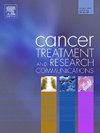Improving fertility preservation for male cancer patients: A scoping review of barriers and facilitators
IF 2.4
Q3 Medicine
引用次数: 0
Abstract
Background
Fertility preservation (FP) is an important aspect of cancer care for male patients of reproductive age; however, there is a lack of research on male experiences of FP. This scoping review aims to identify barriers and facilitators to FP among male cancer patients, based on both patient and healthcare provider/researcher perspectives.
Method
We conducted a scoping review following the Joanna Briggs Institute methodology and reported results according to the PRISMA-ScR checklist. We searched MEDLINE/PubMed, CINAHL, APA PsycInfo, and Web of Science, with supplemented hand-searching of the ESHRE website and reference lists. We included primary studies published in English (2001–2023) reporting on FP in male cancer patients. Findings were mapped to the Theoretical Domains Framework (TDF).
Results
A total of 56 studies met the inclusion criteria. Eleven TDF domains were applicable, with one additional domain, “Patient Characteristics”, added inductively. Among patients, the most frequently coded domains were “Social Influences”, “Goals, Beliefs about Capabilities”, and “Emotion”. For providers/researchers, key domains included “Environmental Context and Resources”, “Patient Characteristics” and “Knowledge”.
Conclusion
A combination of social, psychological, and contextual factors shapes barriers and facilitators to FP in male cancer patients. Addressing these barriers could improve male cancer patients’ quality of life and well-being during treatment and beyond. Recommendations include formalised FP care pathways with an educated, multidisciplinary team, which should be supported by concrete legal and ethical guidelines integrated in policy frameworks concerning cancer care. Applying the TDF can support the development of targeted, evidence-informed strategies to improve FP integration in cancer care.
改善男性癌症患者的生育能力保存:障碍和促进因素的范围审查
生育能力保存(fertility preservation, FP)是育龄男性患者癌症护理的一个重要方面;然而,对男性生育经验的研究却很缺乏。本综述旨在根据患者和医疗保健提供者/研究人员的观点,确定男性癌症患者实施计划生育的障碍和促进因素。方法我们按照Joanna Briggs研究所的方法进行了范围审查,并根据PRISMA-ScR检查表报告结果。我们检索了MEDLINE/PubMed、CINAHL、APA PsycInfo和Web of Science,并辅以手工检索了ESHRE网站和参考文献列表。我们纳入了2001-2023年发表的关于男性癌症患者生育激素的主要英文研究。研究结果被映射到理论领域框架(TDF)。结果56项研究符合纳入标准。11个TDF域是适用的,还有一个额外的域,“患者特征”,是电感添加的。在患者中,最常见的编码域是“社会影响”、“目标、关于能力的信念”和“情感”。对于提供者/研究人员,关键领域包括“环境背景和资源”,“患者特征”和“知识”。结论社会、心理和环境因素共同构成了男性癌症患者计划生育的障碍和促进因素。解决这些障碍可以改善男性癌症患者在治疗期间和之后的生活质量和幸福感。建议包括由受过教育的多学科团队提供正规的计划生育护理途径,并应得到纳入癌症护理政策框架的具体法律和伦理准则的支持。应用TDF可以支持制定有针对性的循证战略,以改善计划生育在癌症治疗中的整合。
本文章由计算机程序翻译,如有差异,请以英文原文为准。
求助全文
约1分钟内获得全文
求助全文
来源期刊

Cancer treatment and research communications
Medicine-Oncology
CiteScore
4.30
自引率
0.00%
发文量
148
审稿时长
56 days
期刊介绍:
Cancer Treatment and Research Communications is an international peer-reviewed publication dedicated to providing comprehensive basic, translational, and clinical oncology research. The journal is devoted to articles on detection, diagnosis, prevention, policy, and treatment of cancer and provides a global forum for the nurturing and development of future generations of oncology scientists. Cancer Treatment and Research Communications publishes comprehensive reviews and original studies describing various aspects of basic through clinical research of all tumor types. The journal also accepts clinical studies in oncology, with an emphasis on prospective early phase clinical trials. Specific areas of interest include basic, translational, and clinical research and mechanistic approaches; cancer biology; molecular carcinogenesis; genetics and genomics; stem cell and developmental biology; immunology; molecular and cellular oncology; systems biology; drug sensitivity and resistance; gene and antisense therapy; pathology, markers, and prognostic indicators; chemoprevention strategies; multimodality therapy; cancer policy; and integration of various approaches. Our mission is to be the premier source of relevant information through promoting excellence in research and facilitating the timely translation of that science to health care and clinical practice.
 求助内容:
求助内容: 应助结果提醒方式:
应助结果提醒方式:


